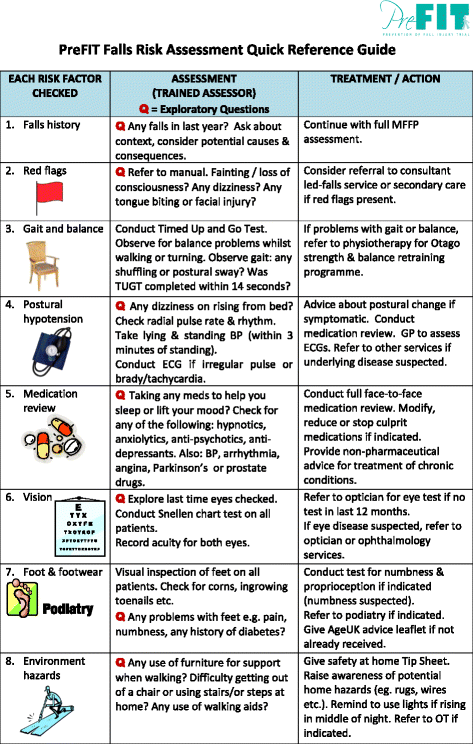The Best Strategy To Use For Dementia Fall Risk
The Best Strategy To Use For Dementia Fall Risk
Blog Article
The Facts About Dementia Fall Risk Revealed
Table of ContentsAn Unbiased View of Dementia Fall RiskWhat Does Dementia Fall Risk Mean?An Unbiased View of Dementia Fall RiskExcitement About Dementia Fall RiskLittle Known Questions About Dementia Fall Risk.
The FRAT has 3 sections: drop risk standing, danger aspect checklist, and action strategy. A Loss Threat Standing consists of information about background of current falls, drugs, psychological and cognitive condition of the individual - Dementia Fall Risk.If the client ratings on a danger variable, the matching variety of points are counted to the person's autumn risk score in the box to the far right. If an individual's fall risk rating completes five or greater, the person is at high threat for falls. If the patient scores just four points or lower, they are still at some danger of falling, and the registered nurse should use their ideal scientific evaluation to handle all autumn danger elements as part of an alternative treatment plan.
These standard strategies, in basic, aid create a secure setting that minimizes accidental falls and marks core preventive actions for all clients. Signs are important for patients at threat for falls.
The 6-Second Trick For Dementia Fall Risk
Wristbands need to consist of the client's last and initial name, day of birth, and NHS number in the UK. Details ought to be printed/written in black versus a white background. Just red color should be made use of to signify unique person condition. These referrals are consistent with current developments in individual recognition (Sevdalis et al., 2009).
Products that are as well far might require the client to get to out or ambulate unnecessarily and can possibly be a danger or add to falls. Assists avoid the patient from heading out of bed without any type of assistance. Nurses respond to fallers' telephone call lights quicker than they do to lights started by non-fallers.
Aesthetic impairment can greatly trigger falls. Hip pads, when worn effectively, may reduce a hip crack when autumn occurs. Maintaining the beds closer to the floor lowers the danger of falls and severe injury. Positioning the bed mattress on the floor significantly minimizes loss danger in some health care settings. Low beds are made to reduce the range an individual drops after moving out of bed.
Excitement About Dementia Fall Risk
Individuals that are tall and with weak leg muscular tissues who try to rest on the bed from a standing position are likely to fall onto the bed due to the fact that it's look what i found also low for them to decrease themselves securely. Likewise, if a high patient efforts to get up from a reduced bed without support, the client is likely to drop back down onto the bed or miss the bed and drop onto the floor.
They're designed to advertise timely rescue, not to stop falls from bed. Audible alarm systems can additionally remind the individual not to rise alone. Making use of alarms can additionally be a replacement for physical restraints. Apart from bed alarm systems, raised guidance for risky individuals also may assist protect against drops.

People with a shuffling gait boost fall chances dramatically. To reduce loss danger, footwear need to be with a little to no heel, thin soles with slip-resistant tread, and sustain the ankles. Encourage directory person to make use of nonskid socks to stop the feet from sliding upon find more info standing. Nevertheless, encourage clients to use appropriate, well-fitting shoesnot nonskid socks for ambulation.
Get This Report about Dementia Fall Risk
In a research, homes with ample illumination report less drops (Ramulu et al., 2021). Improvement in illumination at home may minimize loss rates in older adults.

Caretakers work for ensuring a safe and secure, protected, and risk-free setting. Research studies showed extremely low-certainty evidence that caretakers decrease loss risk in acute care health centers and just moderate-certainty that options like video clip monitoring can reduce sitter use without increasing fall threat, recommending that caretakers are not as valuable as at first thought (Greely et al., 2020).
Dementia Fall Risk Fundamentals Explained

Increased physical fitness reduces the danger for drops and limits injury that is endured when autumn transpires. Land and water-based exercise programs might be similarly useful on balance and stride and therefore decrease the danger for falls. Water exercise might add a positive benefit on equilibrium and gait for women 65 years and older.
Chair Rise Exercise is a basic sit-to-stand workout that helps strengthen the muscle mass in the thighs and buttocks and boosts flexibility and independence. The goal is to do Chair Rise workouts without utilizing hands as the customer becomes stronger. See sources section for a detailed guideline on just how to execute Chair Rise exercise.
Report this page